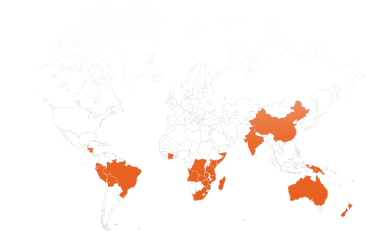Culture Shock whilst abroad
Travellers often struggle with culture shock. There are many ways to cope and adjust to your host country.The Culture Shock Phase
It occurs as a result of total immersion in a new culture. You may be anxious because you do not speak the language (even in English speaking countries with their own strong accents/dialects), know the customs, or understand people’s behaviour in daily life. Travellers find that “yes” may not mean “yes”, that friendliness does not necessarily mean friendship, or that statements that appear to be serious are really intended as jokes. You may be unsure as to when to shake hands or embrace, when to initiate conversation or how to approach a stranger.
The notion of culture shock helps explain feelings of bewilderment and disorientation… difficulties in coping with the new society may arise. When volunteers enter a strange culture you may feel like a “fish out of water”. You can feel at times that you do not belong and consequently may feel alienated from native members of the culture.
When this happens, volunteers may want to reject everything about the new environment and may glorify and exaggerate the positive aspects of your own culture. The severity of culture shock depends on your personalities, language ability, emotional support, and duration of stay. It is also influenced by the extent of the differences, either actual or perceived, between the two cultures. There are recognised periods of adjustment and although the stages in the cycle do not always occur in the same order and some stages may be skipped, the following pattern is a common one.
The Adjustment Process in a New Culture
- Honeymoon Period -Initially people are fascinated and excited by everything new. The volunteer is elated to be in a new culture.
- Culture Shock -The volunteers becomes immersed in new problems: Housing, transportation, shopping, language. Mental fatigue results from continuously straining to comprehend the foreign language. Complaints are the first symptoms.
- Initial Adjustment – Everyday activities such as housing and shopping are no longer major problems. Although the volunteer may not be fluent in the language, basic ideas and feelings in the second language or new dialect can be expressed.
- Mental Isolation – You have been away from family and good friends for a long period of time and may feel lonely. You may still feel that you cannot express yourself as well as you can in your native culture. Frustration and sometimes a loss of self-confidence result. Some volunteers remain at this stage.
- Acceptance and Integration – A routine (i.e.-work, business or school) has been established. The volunteer has accepted the habits, customs, foods, and characteristics of the people in the new culture. You feel comfortable with friends, the classmates and culture of the country.
The Re-entry Culture Shock:
A similar process occurs when a person returns to their native country, although the states are usually shorter and less intense. It can be hard to express to family/friends about your experience and pictures/words can only do your trip so much justice. You can use your Kaya Community site to keep in touch with others returning from volunteering abroad to realise others have had the same experiences.
Some ways to combat stress produced by culture shock are:
- Be patient, the act of acculturating is a process of adaptation to new situations. It takes time
- Learn to be constructive. If you encounter an unfavourable environment, don’t put yourself in that position again. Be easy on yourself
- Learn to include a regular form of physical activity in your routine. This will help combat the sadness and loneliness in a constructive manner. Exercise, swim, take an aerobics class, etc.
- Relaxation and meditation are proven to be very positive for people who are passing through periods of stress
- Maintain some contact with your ethnic group. If you have someone you can turn to when you are frustrated who can understand your perspective you will reduce your feelings of alienation in context
- Maintain contact with the new culture. Learn the language. Volunteer in community activities that allow you to practice the language that you are learning. This will help you feel less stress about language and useful at the same time
- Establish simple goals and evaluate your progress
- Maintain confidence in yourself. Follow your ambitions and continue your plans for the future.
